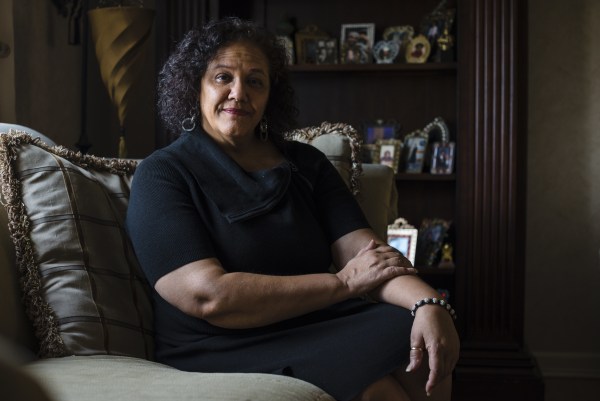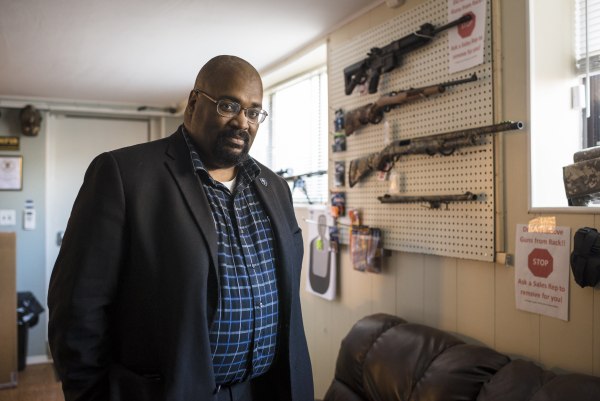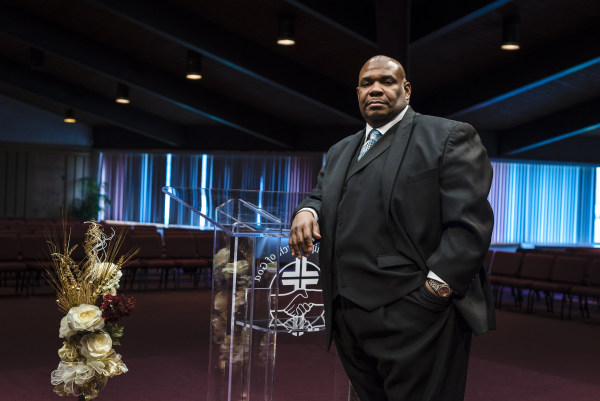PA Bill Number: SB1125
Title: Providing for welcoming schools.
Description: An Act amending the act of March 10, 1949 (P.L.30, No.14), known as the Public School Code of 1949, providing for welcoming schools.
Last Action: Referred to Education
Last Action Date: Dec 22, 2025
The Age of Trump Is Producing More Black Gun Owners :: 05/13/2017
CLEVELAND — When Lesley Green was a little girl in Houston in the 1960s — just a few decades after the routine lynchings of blacks in the South — her father would go off to work a late-night shift and leave a gun and a pile of bullets behind.
If any strangers came looking for trouble, he told Green and her sister, you blast them into the stars.
Nobody ever came looking. But even as an 11-year-old, learning to shoot a gun she could barely lift, Green said she recognized the important lesson her father was teaching her about being black in America: it's a dangerous world out there, and neither the government nor the police are likely be there to save you if trouble decides to make a visit.
Green kept a gun of her own into early adulthood but got rid of it once she settled down and had a family. In the 25 years since, Green, now 60 and living in Cleveland, hasn't touched a gun. At least, not until the election of President Donald J. Trump.
"There's some fiery rhetoric that some would say is incendiary racist rhetoric from the White House," Green said on a recent evening, sitting in her living room sipping British tea from her finest tea set and nibbling on marble pound cake, cheese and crackers. "White supremacy groups are kind of feeling emboldened."
And so Green, a grandmother, is now in the market for a handgun.

Lesley Green at her home in Cleveland. Green learned to shoot a gun as a child and is contemplating becoming a gun-owner again. Angelo Merendino / for NBC News
"It'll be one of those smaller ones that can be concealed very easily," she said. "And nothing that's going to be so powerful. I'm not into that. I don't need nothing powerful. I just need something that stops somebody if they come after me."
That same sense of anxiety appears to be responsible for a growing number of black gun owners. While no agency or group keeps track of gun sales by race, interviews with firearms dealers and gun clubs across the country strongly suggest a sharp rise in the number of African-Americans buying guns since Trump's election. Many are walking into gun shops to arm themselves out of fear that his election has rekindled old racial flames, emboldening white supremacists and stoking tension between the races.
Owners of gun ranges say first-time black gun buyers are flocking in, filling open seats in gun-safety and concealed-carry classes, and diversifying the ranks of enthusiasts, who tend to be older white males.
"People feel that they have, perhaps, a president that they don't feel is going to protect them, that's there for them," said Kevin Jones, the Ohio director of the National African-American Gun Association and co-owner of Urban Sports Unlimited in Cleveland.
Jones said that since the election he's seen about a three- or four-fold increase in African-Americans coming to his shop to buy firearms. Most of them are black women, he said, followed by senior citizens, younger people and college students. Many of them have also joined black gun clubs and the African-American gun association. Jones said that on a good day his chapter of the NAAGA can get as many as five to 10 inquiries about joining.
"People feel like they don't have a voice in the government and that the government is changed to a point where it doesn't care about protecting them," he said. "It cares about something else completely. So when you have that, you're going to have people losing confidence in police protection and losing confidence in their political structure and everything surrounding that."

Kevin Jones, the Ohio state director of the National African-American Gun Association and co-owner of Urban Sports Unlimited in Cleveland. Angelo Merendino / for NBC News
New President, New Call to Action
The election of President Barack Obama was a boon for the gun industry. Spurred by fears that he would tighten gun laws or start confiscating firearms from private citizens, gun sales exploded over his two terms in office. His last years in office were record years for gun sales, and stock prices for some of the industry's biggest manufacturers soared.
But the election of Trump, endorsed by the National Rifle Association earlier than any other candidate in the organization's history, has largely had the reverse effect. With little concern among gun owners that Republicans will try to grab their guns, arms sales have dropped precipitously among the general population.
Except among minorities, according to gun stores that serve them. In Austin, Texas, Michael Cargill, owner of Central Texas Gun Works, said that his store has been inundated with calls. Sometimes they come 15 or 20 in a row, from all across the state and country, from people looking to purchase firearms for the first time. The majority, he said, are blacks and members of the LGBTQ community who've found him through the National African-American Gun Association's website and are eager to do business with a black-owned gun store.
"We're seeing people in the African-American and the LGBTQ community coming in and asking questions and they want to learn how to shoot, and then purchase a firearm and then get a license in order to carry it," Cargill said. "It's different this time, versus when President Obama was in office. Back then, people were saying, 'Hey, I heard this was going to be banned, I want one of those,' without any research at all. Now people are doing their research and making informed decisions."
Cargill and other black gun dealers say they haven't suffered from the so-called "Trump Slump" that other sellers have. He credits his bump in sales as "directly related to the current administration."
"People feel that some of the people supporting President Trump are coming across as racist, so they're feeling that racial tension," he said. "They're thinking maybe they should carry a firearm just in case."
Jackie Jackson, president of the 54th Massachusetts Gun Club in Pensacola, Florida — named after the famed all-black Civil War infantry regiment — said he started the club shortly before the election. Since then it has grown nearly 10-fold, from about three members to more than 25 active members since the election.
Jackson said that he's noticed more black customers at gun shows, firing ranges and dealers. Over and over, he said, he hears the same conversation.
"I'd say eight out of 10 times at some point it gets to the conversation about Trump and the level of outward hostility we're feeling," Jackson said. "It's palpable now, where it really wasn't the case before. It was more subdued."
In Pensacola, often referred to as "South Alabama" because of its conservative population and proximity to the state, there has always been the occasional Confederate flag license-plate holder and banner. But in the wake of the election, Jackson said, he's seeing more large Confederate flags flying next to Trump flags.
"You really started seeing an outward hostility toward the end of Obama's term and into the election," he said. "People are a little bit more brazen now that Trump got elected."
But it doesn't take Confederate displays to make people nervous. In the Chicago suburbs, Dickson "Q" Amoah, who has spent nearly two decades in the military as an Air Force reservist, said he'd always wanted to start a black gun club and Trump's election seemed like the perfect time to do so.
He and a partner formed the 761st Gun Club of Illinois, located in Oak Forest in the Chicago suburbs, the day after the election. The group held its first meeting in January and today, less than six months later, has a membership of more than 100 members.
"I don't want to say Donald Trump was solely responsible for the number of African-Americans deciding to exercise their Second Amendment rights," Amoah said. "But he was the icing on the cake, the cherry. You see the alt-right groups coming out spewing their hate speech and it sends off alarms. You see the hate crimes going on — race-related, religion-related with the Jewish cemeteries being attacked and all of the swastikas that were popping up."
Amoah, who said he grew up in an anti-gun household, first became acquainted with firearms during basic training in 1999 and later during his first deployment in Iraq as a weapons custodian responsible for cleaning and maintaining soldiers' handguns.
But it wasn't until after the election that he decided to purchase his own weapon and start a club focused on three things: personal protection, hunting, and shooting sports.
The group is also proudly black, with an insignia that includes a snarling black panther.
"We're unapologetically pro-black," he said. "We are also pro-American, pro-Illinois and pro-Second Amendment."
Many of his members are new to gun ownership, but others have been shooting for a long time without a welcoming place to practice or shop. At other gun ranges or stores, Amoah said, his members have seen Colin Kaepernick's face on targets, or Confederate flags hanging on the wall. Others told him they've heard the n-word thrown around. He said black gun-owners also have to contend with stereotypes of black men as gun-toting gangsters.
"We wanted to change the stigma of what the typical gun owner looks like," he said. "Society has made African-Americans and black people feel that the Second Amendment wasn't for us. Initially it probably wasn't for us. Our point is, you are as American as anyone else, as any white person in this country, and the Second Amendment is for you too."
Hate Hits Home
Lesley Green's decision to get a gun came the day after Trump won the election. She received a frightening phone call from her 19-year-old daughter, a freshman at the University of Cincinnati. Through hysterical tears, her daughter told her that a group of white nationalists were outside of her dorm building handing out pamphlets and signing students up to join their resurgent movement.
The fear in the girl's voice shook Green to the core. As a bi-racial woman, she raised her family as "a little rainbow coalition" and sent her youngest daughter to a mostly-white private high school where she was one of only a few black students, mostly buffered from any overt racism.
"It's been very hurtful to me to see some of the things that she's had to deal with," Green said.
There were other incidents at her daughter's school as well, she said, including someone putting "Colored-Only" on a water fountain. At one point, a man walked through campus with an assault-style rifle slung over his shoulders, a pistol on his waist and two others in his boots, she said. Students and staff were concerned, but it's legal in Ohio to openly carry firearms in public.
The idea that her daughter, not too much older than she was when her father taught her how to shoot, would be walking through a campus the size of a large town with packs of white supremacists roaming around—literally at the Mason-Dixon Line where it touches Ohio—was the final straw on the scale, leading her to once again enter a gun store.
The rate of African-American gun ownership has remained much lower than that for whites for decades. As recently as 2014, just 19 percent of black households reported owning a gun, while 41 percent of white households did, according to the Pew Research Center.
While the number of gun-owning households has fallen across racial demographics, the low black gun-ownership rate belies a deep, fraught tradition in America.
That tradition emerged largely in the wake of the Civil War, when many of the approximately 200,000 black soldiers emerged from the war as free men toting their military-issued guns. They also were granted the legal right to own and purchase weapons on the open market. But during the period after the Civil War known as Reconstruction, when free blacks began taking advantage of their newfound freedoms to participate in business, politics and governing, white supremacists and the former slave-owning class did everything possible to drive blacks as far back into slavery as possible.
That included enacting local laws called Black Codes aimed at not just stripping blacks of their freedoms, but their guns. Many pro-gun groups, black and white alike, have pointed to these early laws as proof of the nefarious nature of gun-control and its "racist roots."
As Ida B. Wells, the famed black journalist and anti-lynching crusader, wrote in 1892: "A Winchester rifle should have a place of honor in every black home, and it should be used for that protection which the law refuses to give. When the white man who is always the aggressor knows he runs as great risk of biting the dust every time his Afro-American victim does, he will have greater respect for Afro-American life."
The effort to keep guns out of the hands of blacks continued well into the civil rights and black power eras of the 1960s.
California passed strict gun measures after the Black Panther Party for Self-Defense first began following behind Oakland police officers on patrol carrying law books and guns, and later in 1967 marched into the statehouse, legally armed. But the assassinations of the 1960s, combined with the spasms of urban violence in later years of that decade, led many blacks to turn away from guns, which were often seen as producing more pain than protection. Only in the rural South did many black families continue a culture of hunting, sport shooting and self-protection, and now that culture is starting to spread further.
In a House of Worship, Parishioners Pack Heat
On a recent Saturday morning Lesley Green joined a couple of dozen other black men and women inside a large classroom inside Fellowship Church of God here in Cleveland, where Kevin Jones was leading a concealed-carry class. He went over the key rules to safely handling a firearm: keep your finger off the trigger until you plan to use it; treat the gun as if it's always loaded, even when it's not.
During the all-day session Jones and his partners took the class to an outdoor range about 30 minutes outside of the city, where the group members got to squeeze off their first shots. The nerves among the group ranged from nervous to at ease.
Latricha Nafasi, eyes protected by safety goggles and ears by heavy-duty ear muffs, lifted a small pistol eye-level, peered down the rear sight, squeezed the trigger, and bang!
She let out an equally loud eek and clapped excitedly.
"I feel scared," she said. "I mean, I'm relieved now that I shot the gun, but it was scary."
Jones's classes at Fellowship have been sold out for months now. The church's pastor, the Rev. Karl Jones (no relation to Kevin Jones), has promoted the sessions as a safe space for congregants to educate themselves about gun use and how to protect themselves. He was one of the class's first students.
"What happened in Charleston just confirmed for me as a pastor that I was heading in the right direction," Rev. Jones said, referring to the 2015 massacre at the Emanuel African Methodist Episcopal Church, in which a young white supremacist murdered the church's pastor and eight parishioners during a Bible study. "I think it confirmed for a lot of people, my staff and all the people, that what we're doing is a good thing."

Rev. Karl Jones, pastor of Fellowship Church of God in Cleveland, hopes his congregants can become educated about gun-use and how to protect themselves. Angelo Merendino / for NBC News
He said when he first introduced the idea of the classes not long before the church massacre, a few of the older church members balked. But he said he framed gun rights as a positive, and warned that ignorance and miseducation can lead to peril. He told them not to back away from the use of guns, but to embrace the right to defend themselves against whatever evils may shake down upon them.
"There were times where they did not allow us, the system did not allow African Americans to even possess [guns]," Rev. Jones said. "So now we're catching up. That's really what we're playing right now, catch-up."
He said he doesn't carry his weapon in church, but a number of congregants do. Men like Kevin Jones stand sentry in the back of the church or are sprinkled throughout the pews.
When asked how he reconciles the idea of armed self-defense with "Thou Shall Not Kill" he said it was simple and clear.
"God never made us to be puppets just to be beat upon and treaded upon," Rev. Jones said. "He made us to be someone that's well educated, knowledgeable, and have enough wisdom and sense to protect yourself, your family, and your possessions. So I believe that."
CORRECTION: An earlier version of this article misstated the name of the president of the 54th Massachusetts Gun Club. He is Jackie Jackson, not Jackie Johnson.
http://www.nbcnews.com/news/nbcblk/age-trump-producing-more-black-gun-owners-n758211



